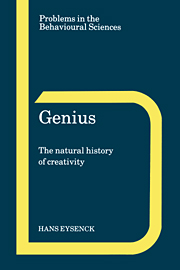Book contents
- Frontmatter
- Contents
- Introduction
- 1 The nature of genius
- 2 Genius and intelligence
- 3 Creativity: measurement and personality correlates
- 4 Conditions for excellence
- 5 Intuition and the unconscious
- 6 The nature of psychopathology: psychoticism
- 7 The roots of creative genius
- 8 From DNA to creativity and genius
- References
- Index
1 - The nature of genius
Published online by Cambridge University Press: 04 August 2010
- Frontmatter
- Contents
- Introduction
- 1 The nature of genius
- 2 Genius and intelligence
- 3 Creativity: measurement and personality correlates
- 4 Conditions for excellence
- 5 Intuition and the unconscious
- 6 The nature of psychopathology: psychoticism
- 7 The roots of creative genius
- 8 From DNA to creativity and genius
- References
- Index
Summary
When a true genius appears in the world,
you may know him by this sign, that the
dunces are all in confederacy against him.
Jonathan SwiftPopular concepts of genius
There are many books on the topic of genius; since the days of Aristotle and Plato, philosophers, artists, teachers, scientists, psychiatrists and lately psychologists have combined to tell us what genius is, how it is produced, how it relates to madness, how it can be cultivated. These contributions consist of writings which rely on common-sense, historical anecdotes, and descriptive passages extolling the wonders of genius. Thus ‘genius’ is depicted as the possessor of a mystical gift that cannot be explained by the ordinary laws of human nature – a conclusion that would immediately make impossible the realization of the research project on which this book is based. It is possible to bring together popular notions of genius by citing a number of definitions. Some of these make genius seem remarkably commonplace. Thus for Buffon, genius was ‘but a great aptitude for patience’. Frederick the Great thought it was a ‘transcendent capacity for taking trouble’. Edison considered it ‘one per cent inspiration and ninety-nine per cent perspiration’, while Disraeli agreed with Buffon – ‘patience is a necessary ingredient of genius’. Thus we learn that genius means hard work, true but not very revealing. It may highlight the absurdity of modern educational methods which stress the alleged natural creativity of children, but refuse to impart the necessary knowledge without which creativity cannot function.
More interesting are quotations telling us about the creativity of genius.
- Type
- Chapter
- Information
- GeniusThe Natural History of Creativity, pp. 11 - 46Publisher: Cambridge University PressPrint publication year: 1995



